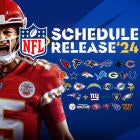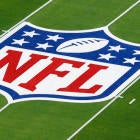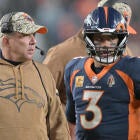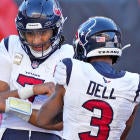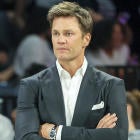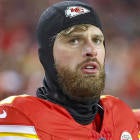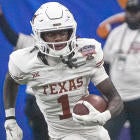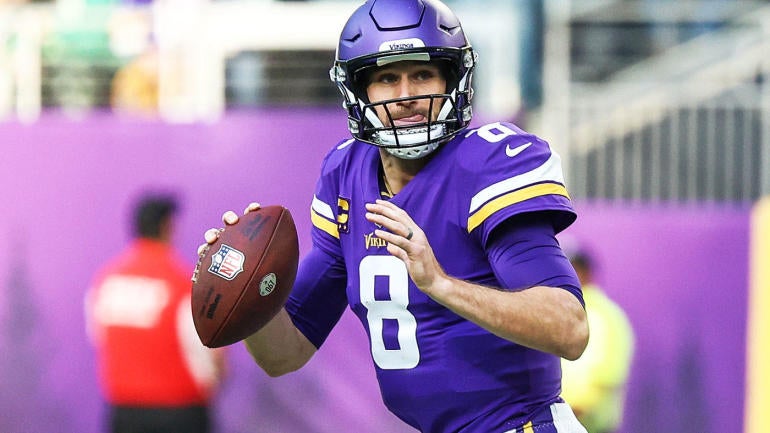
The NBA was turned on its head Wednesday after the Milwaukee Bucks were able to pull off a three-team deal with the Portland Trailblazers and Phoenix Suns that landed them All-Star point guard Damian Lillard. That blockbuster now has the Bucks firmly set as the team to beat in the Eastern Conference and the odds-on favorite to win the NBA title this coming season. It also got us thinking: wouldn't it be awesome if three-team trades were as commonplace in the NFL as they were in the NBA?
There have been three-team deals done in the past, so no team would be breaking new ground if they were to agree to one today, but they are hardly as common as they are in the NBA. One of the more notable three-team trades in the NFL came all the way back on Halloween Day in 1987, when the Rams, Bills, and Colts completed a massive deal that included 10 players and draft picks, including Hall of Fame running back Eric Dickerson.
Using this Lillard deal as the springboard, how about we cook up a few three-team trades in the NFL? Before we do, though, let's not get too in the weeds with the particulars on each team. We're not going to go crazy and give you fine readers at home a popsicle headache by trying to get our math in order as it relates to the salary cap and whether or not a team could or could not absorb a player's contract. We're merely going to identify a handful of teams and try to work out the light parameters of a blockbuster deal in the same vein as we see in the NBA.
Alright, let's get nuts.
Cowboys, Jets, and Vikings trade
Jets get: Kirk Cousins
Vikings get: Jets 2025 second round, Cowboys 2024 fourth-round pick, Trey Lance
Cowboys get: D.J. Reed
This is a deal that allows two teams that were eyeing the playoffs entering the season to help keep those hopes alive after dealing with significant season-ending injuries. Meanwhile, the third team in this mix is given the opportunity to hit the reset button early after a winless start to the year and build up its war chest of draft picks.
Why it makes sense for the Jets: New York had high hopes coming into the 2023 season after pulling off the biggest trade of the offseason and acquiring Aaron Rodgers. As you know by now, those dreams of snapping their playoff draught were dashed just four snaps into Rodgers' tenure after he suffered a season-ending Achilles tear. Since then, the team has turned back to Zach Wilson, and the results haven't been good. Wilson clearly isn't able to elevate this roster and has been a key reason for it losing games. So, dipping back into the trade market for an established quarterback makes sense. Cousins is in the final year of his deal and, while he may not have the same ceiling as Rodgers, he'd make them a playoff contender upon arrival. While losing Reed, who is signed through 2024, would be a dent in the secondary, getting a serviceable quarterback is worth whatever they may lose in the secondary.
Why it makes sense for the Vikings: Minnesota tabled contract talks with Cousins until this coming offseason, making him a lame-duck quarterback with no deal in place beyond 2023. Ownership even deflected questions about Cousins' long-term future with the team this summer. With the Vikings 0-3 to start the year, it's at least worth having the conversation of starting the rebuild early by moving on from Cousins in-season and gaining future draft capital. They could also throw a dart at former 49ers castaway Trey Lance to see if he can tap back into his potential, which made him the No. 3 overall pick back in 2021. And if Lance again proves to not be a quarterback you can build around, Minnesota will have a worse enough record to be in the mix for a QB in what is expected to be a promising class in 2024.
Why it makes sense for the Cowboys: Dallas lost All-Pro cornerback Trevon Diggs to a season-ending ACL tear he suffered in practice last week, putting a dent into its secondary. While Stephon Gilmore is still manning one of the boundary corner spots, it'd behoove the Cowboys to try and strengthen that unit back up, as they do possess the talent to make a deep playoff run. However, they'll face several elite quarterbacks along the way, so a player like Reed would go a long way in helping cushion the blow of losing Diggs.

Pick Six Newsletter
Crafted By The Best NFL Experts
Get the day's big stories + fun stuff you love like mock drafts, picks and power rankings.
Thanks for signing up!
Keep an eye on your inbox.
Sorry!
There was an error processing your subscription.
Chiefs, Buccaneers and Bears trade
Chiefs get: Mike Evans
Buccaneers get: Justin Fields
Bears get: Chris Jones
This is a deal that would realistically never be agreed upon due to an uneven distribution of positional value, but it's fun to think about who would say no to this deal and why when you start to break it down. On paper, it's pretty fascinating for all sides.
Why it makes sense for the Chiefs: Patrick Mahomes is talented enough that he can make an offense hum with just about anybody. That said, when you take Travis Kelce out of the equation like they were forced to do in Week 1, we saw that Kansas City's offense can stall out. By bringing in a player like Mike Evans, it'd make this Chiefs offense go nuclear. Trying to prevent Evans from beating you over the top and then slowing down Kelce over the middle of the field would be a literal nightmare for opposing secondaries and would be reminiscent of Randy Moss joining Tom Brady and the Patriots in 2007. Yes, losing a top-10 defensive player in the league in Chris Jones will sting, but K.C. does have a lot of young pieces along its defensive line, and Evans would keep them as an elite offense even as Kelce turns 34 in October.
Why it makes sense for the Buccaneers: Mike Evans is a franchise icon, so moving on from a player of his stature would not be an easy decision. That said, he's in the final year of his deal, and if the Buccaneers fall out of contention and decide that the next course of action is a rebuild, that could open the door for his departure. And if they could get a quarterback out of the deal, you essentially have to do it. I'm still a believer in Fields, and if he's put in the right situation, he has elite tools that could make him a franchise quarterback. Inserting him in Tampa Bay and a sturdier offensive line headlined Tristan Wirfs would give us a better chance of seeing his peak potential. While Baker Mayfield has been solid so far, this type of move has the ability to turn the Bucs around overnight for multiple years with a former first-round QB who is still only 24.
Why it makes sense for the Bears: The Bears are the first team that says no in this hypothetical trade. They'd realistically need much more for someone they view (or viewed) as a franchise quarterback given his age. Still, this team has issues all across its roster, including its defensive line. Chris Jones would come in and immediately anchor their front seven and be the face of that side of the ball. Chicago also has the cap space next offseason (second-most in the NFL) to secure him long-term. Fields has struggled so far this season to the point where people are questioning whether or not he is a franchise quarterback. If the Bears front office determines he's not "the guy," maybe they'd be interested in shipping him away for a superstar player and picks, while once again falling to the bottom of the league and splashing into the Caleb Williams sweepstakes.















